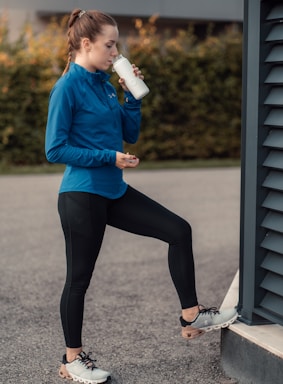Beat the Heat: The Importance of Staying Hydrated in Summer
HEALTH & WELLNESS
7/31/20233 min read


Beat the Heat: The Importance of Staying Hydrated in Summer
Summer is a time for outdoor activities, beach trips, and backyard barbecues. However, as the temperature rises, it becomes crucial to pay attention to our body's hydration needs. Dehydration can have serious consequences on our health and well-being. In this article, we will explore the importance of staying hydrated in summer and the indications of dehydration.
Understanding Dehydration
Dehydration occurs when our body loses more fluids than it takes in. This can happen due to various factors such as excessive sweating, inadequate fluid intake, or certain medical conditions. When we are dehydrated, our body doesn't have enough water to carry out its normal functions, leading to a range of symptoms.
The Importance of Hydration
Proper hydration is essential for maintaining overall health and well-being, especially during the hot summer months. Here are some reasons why staying hydrated is crucial:
1. Regulating Body Temperature
One of the primary functions of water in our body is to regulate body temperature. When we sweat, our body cools down as the sweat evaporates from our skin. However, if we are dehydrated, our body's ability to regulate temperature is compromised, making us more susceptible to heat-related illnesses such as heat exhaustion or heatstroke.
2. Supporting Physical Performance
Whether you're engaging in outdoor sports or simply going for a walk, staying hydrated is essential for optimal physical performance. Dehydration can lead to fatigue, muscle cramps, and decreased endurance, hindering your ability to enjoy summer activities to the fullest.
3. Promoting Digestive Health
Adequate hydration is necessary for maintaining a healthy digestive system. Water helps in the digestion and absorption of nutrients, prevents constipation, and supports overall gastrointestinal health. Without enough fluids, we may experience digestive issues such as bloating, indigestion, and irregular bowel movements.
4. Enhancing Skin Health
Our skin is the largest organ in our body and plays a vital role in protecting us from external factors. Staying hydrated helps maintain the elasticity and moisture of our skin, reducing the risk of dryness, wrinkles, and other skin problems. Proper hydration also aids in the detoxification process, keeping our skin clear and radiant.
Indications of Dehydration
Recognizing the signs of dehydration is crucial to prevent further complications. Here are some common indications of dehydration:
1. Thirst
Feeling thirsty is the body's way of indicating that it needs more fluids. While mild thirst may be a normal response, excessive or persistent thirst can be a sign of dehydration.
2. Dark Urine
The color of your urine can be a good indicator of your hydration status. Dark yellow or amber-colored urine is a sign that you need to drink more fluids.
3. Dry Mouth and Lips
When we are dehydrated, our body reduces saliva production, leading to a dry mouth and lips. If you notice that your mouth feels sticky or your lips are dry and cracked, it's a sign that you need to hydrate.
4. Fatigue and Dizziness
Dehydration can cause fatigue, dizziness, and lightheadedness. If you feel weak or have difficulty concentrating, it may be due to inadequate hydration.
5. Headaches
Headaches are a common symptom of dehydration. When our body lacks water, it can affect the flow of oxygen and nutrients to the brain, leading to headaches or migraines.
6. Muscle Cramps
Dehydration can result in muscle cramps, especially during physical activity. If you experience sudden muscle spasms or cramps, it may be a sign that you need to replenish your fluids.
Tips for Staying Hydrated
To beat the heat and stay hydrated this summer, follow these simple tips:
1. Drink Plenty of Water
Water should be your go-to beverage for staying hydrated. Carry a reusable water bottle with you and sip on it throughout the day. Aim to drink at least 8 glasses of water per day, or more if you are engaging in physical activities.
2. Eat Hydrating Foods
In addition to drinking water, you can also increase your fluid intake by consuming hydrating foods. Fruits and vegetables with high water content, such as watermelon, cucumber, and strawberries, can help replenish your body's fluids.
3. Avoid Excessive Alcohol and Caffeine
Alcoholic and caffeinated beverages have diuretic properties, which can increase fluid loss and contribute to dehydration. Limit your consumption of these drinks, especially in hot weather.
4. Set Reminders
In our busy lives, it's easy to forget to drink enough water. Set reminders on your phone or use apps that can help you track your water intake and remind you to hydrate regularly.
5. Stay Cool and Seek Shade
Avoid prolonged exposure to direct sunlight and seek shade whenever possible. By staying cool, you can reduce excessive sweating and minimize fluid loss.
6. Replenish Electrolytes
During intense physical activity or prolonged exposure to heat, it's important to replenish electrolytes lost through sweat. You can do this by consuming sports drinks or eating foods rich in electrolytes, such as bananas or coconut water.
As the temperature soars, it's essential to prioritize your body's hydration needs. Dehydration can have serious implications on your health and well-being, affecting your physical performance, digestion, and even your skin health. By recognizing the indications of dehydration and following simple tips for staying hydrated, you can beat the heat and enjoy a healthy and refreshing summer.
Contacts
asharma@thestylebuzz.com
Subscribe to our newsletter
TheStyleBuzz offers informative content of a general nature. However, it is important to note that this information should not be considered as a substitute for professional medical advice, diagnosis, or treatment. TheStyleBuzz is committed to providing accurate and reliable information, but it is important to use your own discretion and seek professional advice when necessary.
